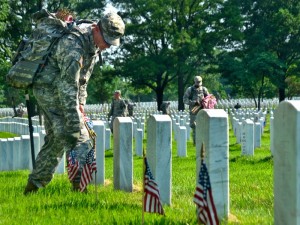Memorial Day: Remembering Loyce Deen
I’ve written in the past about how my Pop carried with him a haunting memory from his time aboard the aircraft carrier Essex in World War II. Anti-aircraft fire had killed a turret gunner during a sortie. Pop, whose job it was to repair and prepare planes for the next mission, went up to inspect the plane as soon as it landed and saw the gunner’s body. At Pop’s recommendation, the captain of the Essex gave the order to bury the man in the plane in which he had given his life for his country. This burial at sea was unique. It was the only time during World War II that a valuable plane was ordered to be used as a coffin.
The burial itself was filmed and included in the 1950s series, “Victory at Sea.” Pop saw it for the first time when it was rebroadcast 20-25 years ago. Seeing that on the Essex dredged up disturbing memories of what Pop had seen on that long-ago day, and for years afterward he would retell that vivid story many nights after consuming copious quantities of Jim Beam.
The story didn’t end for me with Pop’s passing in 1999, because several years later, I stumbled onto a website about the airman who was buried in his plane. Suddenly, I knew many more details. His name was Loyce Edward Deen of Altus, Oklahoma. The fatal flight took place on November 5, 1944 in the Battle of Manila. The three-crew plane was the Grumman TBM (torpedo bomber) V-15.
The website provides interesting and touching details about the young Oklahoman. Loyce was his parents’ seventh child. He was followed four years later by one last sibling, a brother with Down’s Syndrome. Loyce was very close to his kid brother, who sadly died when Loyce was in eighth grade. Three years later, his mom had a stroke. Loyce helped care for her until she passed away about a month later.
In 1942, Loyce joined the Navy. On October 24, 1944, his foot was wounded by shrapnel in the Battle of Leyte Gulf. Heroically, he simply wrapped his foot and continued to fight on both the 24th and 25th. At the end of the month, Loyce had the option of recuperating on a hospital ship until his foot mended, but he insisted on staying with his two crewmates, pilot Lt. Robert Cosgrove and Radioman Digby Denzek. Character, courage, loyalty and love—Loyce Deen had them in spades. It was people like him who made the USA great.
The next week, at the age of 23, Loyce was killed instantly when [this is graphic folks, so you may wish to skip to the next paragraph] anti-aircraft fire decapitated him. It was that jarring, gruesome image that haunted my Pop. One memorable detail is the stoicism of Loyce’s crewmates. Denzek reported to Cosgrove over the intercom that “Deen was hit bad.” “Hit bad”—what a compassionate and wise euphemism. Denzek didn’t want to grieve or distract Cosgrove with the 24-year-old pilot already facing the nerve-wracking task of flying a damaged aircraft two anxious hours back to the Essex.
I feel like I knew Loyce Deen, even though our lifespans didn’t overlap and I’ve never met anyone who knew him. “Knowing” him has made a significant difference in my life. The most important male relatives in my life all saw combat in either World War II or Vietnam, but (thank you, Lord) none were killed in action, so for me, Memorial Day was always more of a general than a specific remembrance. That all changed when I found the Loyce Deen website. My Memorial Days are now fuller and more meaningful than before because Loyce crossed paths with Pop.
I‘m sure the descendants of Loyce’s brothers and sisters know what a good man and great hero their great-uncle was. Through this article, I hope many more people will know about him. On Memorial Day 2015, this solemn, reverential holiday, may all patriotic Americans honor the memory of tens of thousands of America’s best—people like Loyce Deen—who gave their lives that we and countless others might live in liberty. God bless them all.


